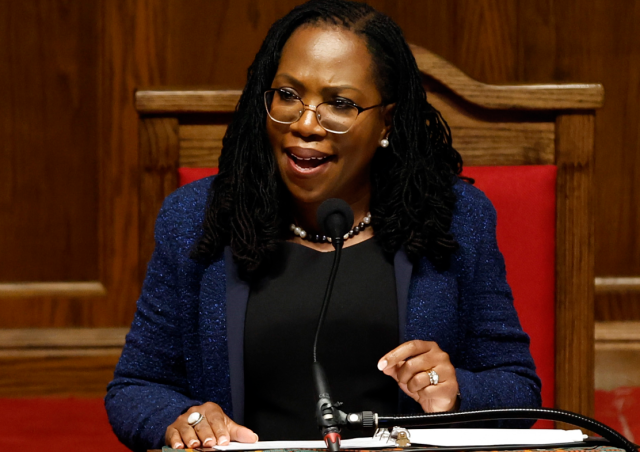
By Keisa Sharpe-Jefferson
For The Birmingham Times
Engaging, inspiring and compelling, U.S. Supreme Court Associate Justice Ketanji Brown-Jackson, making her first visit to Alabama, on Friday delivered a special memorial service address in the historic Sixteenth Street Baptist Church as the city of Birmingham commemorated the 60th year anniversary since the church was bombed killing four little girls on Sept. 15, 1963.
To have Brown Jackson, the first Black female Associate Justice of the United States Supreme Court, standing at the podium in the sanctuary of the building where four young Black girls were killed made as bold a statement as any.
Brown Jackson, who spoke for about an hour, connected the church’s history with her own.
“My parents knew Black history and they went about intentionally teaching it to me as a child. And, of course, as you already know, Alabama is ground zero when it comes to this kind of instruction. So although I’ve not been here before, I know Alabama,” Brown Jackson said.
“…I knew those four little girls were killed simply because they were Black and because, at that time, Black people were rising up to demand equal rights. Tough stuff for a child.”
The 53-year-old Florida native was nominated to the Supreme Court by President Joe Biden in February of 2022. She’s a graduate of Harvard University and Harvard Law School.
Jackson, raised in Florida by parents who were schoolteachers who taught her Civil Rights history, said she has two daughters she will always consider her little girls. “I can imagine no greater horror than to lose a child this way,” she said.
She also pointed out her ties to Alabama, saying her mother, aunt and uncle are all graduates of the state’s Tuskegee University.
“I want to assure you that I actually do know a lot about Alabama and in particular its critical connection to the Civil Rights struggle of African Americans during the 1950s and 1960s,” she said. “While I’ve not been to Alabama, I can quite confidently say that I know Alabama. If you knew my parents, you would understand why.”
On Sept. 15, 1963, a bomb demolished the Sixteenth Street Baptist Church, killing Addie Mae Collins, 14; Denise McNair, 11; Carole Rosamond Robertson, 14; and Cynthia Wesley, 14 and injuring dozens of parishioners.
As a little girl, Brown Jackson said she knew the bombing of the church had occurred and described it as “awakening the nation and the world to the horrors of race-based violence and oppression.”
On Friday, the event drew an overflow crowd of hundreds inside the church including filmmaker Spike Lee, who directed the 1997 documentary, “4 Little Girls,” and was seated on the front row with family members of bombing victims as well as U.S. Rep. Terri Sewell and Birmingham Mayor Randall Woodfin.
Attendees listened, cheered and praised in support of the spirited commemorative three-plus hours long program and received a combination of passionate weekday service, inspirational nuggets and a chorus of hymms that could rival any service preached on Sundays.
Former U.S. Sen. Doug Jones, who as a U.S. attorney prosecuted the church bombers and also led President Joe Biden’s search for what he promised would be the first Black woman on the Supreme Court, introduced Jackson and said she served as “hope.”
“This day, our speaker doesn’t have to say a word,” said Jones. “I’ve never seen anybody introduced that, as she ascends these steps and as she stands in this pulpit – she is the hope. She represents that American dream. Her mere presence is the hope, the possibilities and the dreams. It has been 60 years in the making.”
Brown Jackson also touched on her place in history.
“Why has it taken 232 years and 115 prior appointments for a Black woman to serve on the Supreme Court?” Jackson asked during her speech. “I come to Alabama to wrestle with those questions, in a community that knows first-hand how difficult the journey has been, a place where people remember what it cost to make it this far. I come with the understanding that I did not reach these professional heights on my own, that people of all races and faiths, people of courage and conviction, cleared the path for me in the wake of horrible tragedy.”
The full memorial service may be viewed here.



![Judge_1[1]](https://www.birminghamtimes.com/wp-content/uploads/2023/09/Judge_11.png)
![Judge_2[1]](https://www.birminghamtimes.com/wp-content/uploads/2023/09/Judge_21.png)
![Judge_3[1]](https://www.birminghamtimes.com/wp-content/uploads/2023/09/Judge_31.png)
![Judge_4[1]](https://www.birminghamtimes.com/wp-content/uploads/2023/09/Judge_41.png)
![Judge_4a[1]](https://www.birminghamtimes.com/wp-content/uploads/2023/09/Judge_4a1.png)
![Judge_5[1]](https://www.birminghamtimes.com/wp-content/uploads/2023/09/Judge_51.png)
![Judge_5a[1]](https://www.birminghamtimes.com/wp-content/uploads/2023/09/Judge_5a1.png)
![Judge_6[1]](https://www.birminghamtimes.com/wp-content/uploads/2023/09/Judge_61.png)
![Judge_7[1]](https://www.birminghamtimes.com/wp-content/uploads/2023/09/Judge_71.png)


